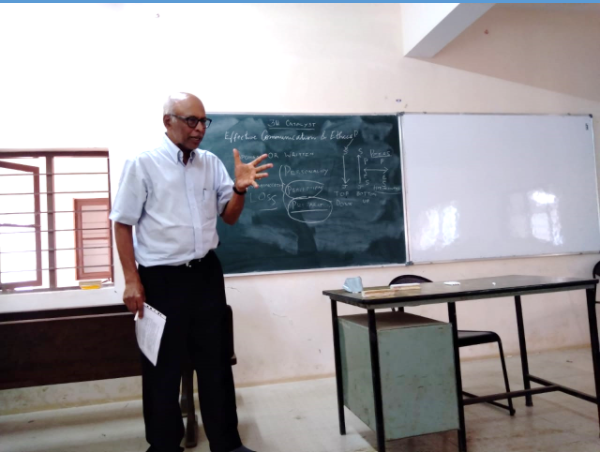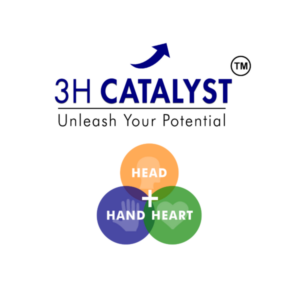On October 8, 2021, 3H Catalyst organized a half-day workshop on Workplace Readiness for students of Government Polytechnic, Immadihalli, Bengaluru. Attended by Computer Science students of all years (1st-3rd year), the workshop had sessions on Developing an Engineering Mindset, Ethics in Business and, Effective Communication for Engineers. Both 3H Catalyst and the students were fortunate to have Shri Gopalan Ramaiya (former MD of Toyota Kirloskar Ltd.) as the keynote speaker for the workshop.
Dwelling on the main topic, the speaker emphasized that an engineering mindset is not just for engineers. Rather, it refers to a set of principles and practices that can be followed by anyone to develop an engineering mindset. The core principle is that one should identify an existing problem or a hidden need and offer workable and impactful solutions to solve the problems in society.

Elaborating further on the principles to follow for an engineering mindset, the speaker laid out the need for a logical and ‘seeking’ mindset with the following characteristics:
- Inquisitiveness – don’t take the easy way out and depend only on google. Research and deeply think about the problem/task at hand.
- Process Orientation – avoid haphazard thinking and be logical in developing and documenting well thought out processes for any task at hand. Break down the processes to manageable details
- Application – Think through the bigger picture within which the process and outcome fits
- Develop Deep Insight and avoid superficial thinking. Eye for detail is a must
- Develop ‘anticipatory skills’ – the ability to think ahead and see how something integrates into a larger whole and the issues that may arise
- Fine tune ability to define the problem/issue. Jumping to a solution without defining the issue leads to faulty diagnosis of problem and hence faulty solutions too). Define the issue precisely
- Recognize the needs of consumers/customers in society. Identify the beneficiaries of your solutions
- Never forget the fundamentals
- Aim for small improvements. Even in daily habits, aim for small improvements that lead to big changes over time
- Innovation is a bigger form of small improvements. Innovations are driven by opportunities to improve, treat a problem and find solutions. Innovation requires disruptive thinking
The speaker illustrated the above principles through examples of small improvements and innovations that solved an everyday problem such as ziplock bags, a toothpaste tube squeezer and a interdental cleaning brush. He passed the examples around in the classroom for students to examine the simple yet effective products that solved a persistent everyday problem.
Dwelling on the main topic, the speaker emphasized that an engineering mindset is not just for engineers. Rather, it refers to a set of principles and practices that can be followed by anyone to develop an engineering mindset. The core principle is that one should identify an existing problem or a hidden need and offer workable and impactful solutions to solve the problems in society.
In the second session on Business Communication and Ethics, the speaker gave the key features of effective communication – whether written or oral:
– Simplicity, pleasantness, respect
– Fluidity without repetition or omission,
– Clarity
– Decisiveness and Consistency
– Purposefulness, Value Addition
– Opening / Conclusion to the communication
The importance of good body language, attentive listening and humility were also emphasized. Avoiding long winding sentences, vague and inconclusive communication were the negative traits that the audience was cautioned to avoid in their business communication.
Regarding ethics in our professional lives, the esteemed and experienced speaker gave the following tips:
- Be Frank (avoid making false commitments)
- Walk the extra mile as a TEAM player
- Never let down your organization or a colleague
- Discuss Issues and NOT personalities (avoid playing Politics)
- Straightforward and not being manipulative
- Seek extra time if need be BUT never be silent or fail to reply
Finally, the speaker advised the students to read English newspapers and magazines in order to develop good vocabulary and power of good articulation. He also exhorted them to speak in English whenever opportunities came up, and avoid being shy in making use of such opportunities.
Students as well as the Head of the Department (Computer Science) Dr Parameswarappa expressed gratitude to the speaker Shri Gopalan Ramaiya for the extremely useful sessions.
3H Catalyst is grateful to Shri Gopalan Ramaiya for consenting to deliver the sessions, and for spending nearly the entire day with the 3H team. His insights and tips are valuable for the students as well as the 3H team.



